- Home
- Jennifer Haigh
Zenith Man Page 2
Zenith Man Read online
Page 2
A MAN’S HOME IS HIS CASTLE. THIS IS YOUR ONLY WARNING.
TRESPASSERS WILL BE SHOT ON SIGHT.
On the day he visited his client at home, Matthew McCurdy was unaware of this history. He rapped at the gate, hollered, and waited, but the client did not appear. He got back into his car and drove several miles, until he got a clear signal. The phone rang a dozen times before Harold answered.
“I was just out to your place,” said Matthew. “It didn’t look like anybody was home.”
Silence on the line.
“Are you there, Mr. Pardee?”
“I heard you,” Harold said.
Matthew drove back to the house and found Harold waiting at the gate. They sat on the front porch drinking mugs of tap water. After a freak early frost, summer had returned.
“Can you think of anybody who spoke to Mrs. Pardee recently? That would help, because—”
Harold was growing tired of this question.
“Someone who can attest to her mental state. Otherwise, you know—” The kid shrugged apologetically.
Harold explained it again. “She wouldn’t see nobody, wouldn’t go noplace. Not even church.” He could see, in the kid’s earlobe, a scar where an earring used to be. Like the shrug, the unfinished sentences, this did not inspire confidence.
“What about a doctor? She must have had a doctor, because—”
Harold waited for him to finish.
“No doctor,” Harold said when he got sick of waiting. “There was a VA doctor in Texas would mail her medicine. He never charged me up front. When the pills came, I sent him a check.” After the doctor died, Barjean stopped taking the pills, which hadn’t helped much anyway, and placed herself in the hands of the Lord. She was devoted to a TV preacher, who every Sunday broadcast a special service for shut-ins. Barjean spoke often of this preacher, who was company for her. She never sent him any money, so Harold didn’t see the harm.
Matthew McCurdy was losing patience. The harm, he explained, was that the TV preacher couldn’t be called as a witness. Barjean was the tree that fell in the wilderness. Or didn’t, with no one there to hear.
Harold got to his feet. “Thanks for stopping by,” he said, a clear signal he’d had enough.
Matthew had hoped for more in the way of cooperation. As he got to his feet, he asked if he might use the toilet.
Though he wanted to, Harold saw no reasonable way he could refuse this request.
Inside, the house was dim and silent. The rooms, not large, had a somnolent quality. Matthew followed Harold into an airless living room with gold-colored curtains, drawn to keep out the sun. There was a plaid sofa, a worn recliner, and an old hi-fi cabinet with sliding doors. On a wheeled cart sat a small Zenith with rabbit-ear antennae; on the floor, waist-high stacks of magazines and mail-order catalogs and spiral-bound notebooks, ranged according to size. The room looked cluttered but organized, as though someone had taken pains to arrange its contents. The sun bleeding through the curtains turned the walls a sickly color, the weak yellow of creamed corn.
The corn-colored walls were covered with notes.
“It’s down the hall,” Harold said.
He stood waiting until Matthew entered the bathroom and closed the door behind him. Then Harold went back out to the porch.
When he heard the screen door slam, Matthew doubled back into the living room. He stood a long time studying the notes on the wall, pages torn from a steno pad and cut into quarters, covered with neat cursive and Scotch-taped to the wall.
Having made known unto us the mystery of His will, according to His good pleasure, which He hath purposed in Himself (Ephesians 1:9)
Buddy Ebsen as Barnaby Jones
Lee Meriwether as Betty Jones
Mark Shera as J. R. Jones
ALOHA BURGERS
1 lb ground beef
½ cup catsup
12-oz can crushed pineapple, drained
“I’ve never seen anything like it,” Matthew told Josh Fine later that evening. “It’s like she was always writing. Like . . .”
A very long pause in which Matthew figured out exactly what he meant to say.
“Like it didn’t matter what she was writing. She was writing just to write.”
There was a name for it, he told Josh. Hypergraphia was a common symptom of temporal lobe epilepsy. Matthew had read about it on the internet.
The Pardee living room contained hundreds of notebooks. That afternoon, Matthew took one from the shelf and opened it randomly. The pages were filled with blue ballpoint, the same careful cursive as the notes on the wall.
Split up because of an argument, Sanford and Son try to get along without each other.
Helen (Audra Lindley) drags Stanley to a marriage counselor after she discovers love letters he wrote to a “Doris.”
A rancher’s mail-order bride impresses everyone but Heath (Lee Majors).
“What are you doing?”
Matthew looked up, startled. Harold stood in the doorway studying him, his affect not quite so flat as usual. His affect, you could say, was pointed.
“That’s her TV book.” Harold took the notebook from Matthew’s hand. There was more he could have said. The notebook was important not because of what was in it, but because Barjean’s hands had been the last to touch it.
“Did she write other—”
“Spit it out,” said Harold.
“Things?”
“She was always writing. It was a hobby of hers.” Harold slid open the door of the hi-fi cabinet. Inside were stacks and stacks of spiral notebooks. “There’s more in the basement.”
“Harold, this could be important.” Matthew spoke very deliberately, in his urgency finishing sentence after sentence. “Will you let me read them?”
Harold deliberated a long moment. “I guess it don’t make any difference now,” he said finally. He hitched up his trouser legs and sat on the sofa to watch Matthew read.
The notebook was a kind of journal. Interspersed among the Bible verses and recipes were Mrs. Pardee’s own observations, notes from daily life:
Set out some milk for the tiger stripe but she didn’t come around. No sign of her in three days. Afraid a fox got her.
Watched the Jerry Lewis telethon and went to bed early. Those poor children are a wonder.
Matthew read each entry carefully, looking for subtext, but he could discern no hint of domestic unrest, marital jealousy, or strife. If Harold Pardee had beaten his wife, she hadn’t considered it worth mentioning. The beatings were less notable than the following events:
The humidity is supposed to break tomorrow. We are running the fan day and night.
Took in 2 pair of Harold’s summer trousers. He has lost about 10 lbs since last year.
Made a pecan bread to use up the bananas before they turn.
Matthew read and read. And between the proverbs and weather reports, the unending details of cooking and housekeeping, a narrative began to emerge. A bizarre kind of love story.
Had a bad spell this morning. Harold brought me tea and ran me a bath. Love beareth all things, believeth all things, hopeth all things, endureth all things (1 Corinthians 13:7).
Reading, Matthew saw no reason on earth Harold Pardee would have killed this wife. For thirty-two years each had been, for the other, the only person in the world.
Had there been a trial, the judge would have sent Harold Pardee to prison. Instead, six weeks before it was scheduled to start, the defendant was saved by a woman he’d never met.
“A colored lady,” he said wonderingly, telling the story to Cob Krug as they sat listening to the ball game in the Zenith shop.
Harold had been saved by a series of events he recognized, immediately, as the handiwork of his Lord and Savior. And because the source of all the world’s mystery liked to pile one wild improbability on top of another, the colored lady who saved Harold Pardee was an Olympic track star.
The mystery of His will.
“A narrative began to em
erge. A bizarre kind of love story.”
The Lord worked in the following way: Early one Saturday afternoon, counsel for the defense was sleeping off a hangover when his mother knocked at his bedroom door. He glanced at his alarm clock, which read 1:10. He’d been out all night, celebrating a buddy’s engagement with a bout of ferocious drinking.
“Sweetie,” said counsel’s mother. “You have a phone call.”
The caller was Josh Fine. “Turn on CNN,” he barked.
Attorney McCurdy sat in front of the television in his underwear, his head pounding, wondering how much, and what exactly, he had drunk. An Asian man—the coroner of Orange County, California—was holding a press conference about an Olympic track star who’d died some weeks before. The woman’s death was news to Matthew, who didn’t follow the Olympics and read a newspaper maybe once a month. The track star had been found dead in her home, a pinkish tint to her teeth and gums.
It took Matthew a moment to grasp the connection. The Orange County coroner’s autopsy was conclusive: the track star had had a seizure and suffocated and died of her epilepsy.
As Barbara Jean Pardee had done.
The track star’s death, under identical circumstances, was an astonishing development. For Harold Pardee it was a stroke of fortune. For Matthew McCurdy the news was anticlimactic, a surprise gift he hadn’t asked for and didn’t actually want. He wanted victory, a win at trial. For weeks he’d interviewed neurologists, graphologists, brain researchers famous in the field. They used electrifying words never heard in Hooterville, medical terms with which Matthew planned to dazzle a jury: grand mal, petit mal, adrenal cortex. The medical experts had been impressed by his fluency, his astute questions. They couldn’t see where he was calling from, the cramped basement office the county had assigned him, a dehumidifier humming in the corner to keep the mildew down.
Grand mal, petit mal, adrenal cortex. Matthew would never use these words at trial because there would be no trial. The lame-duck district attorney required little convincing. The faithless voters of Saxon County had sent him packing after twenty years in office. The people who’d rejected him could shove it.
All charges in the Pardee case were dropped.
The mystery of His will.
“She was a good woman,” Harold told Cob Krug. “I was lucky to have her. I promised to keep her in sickness and in health, and that’s what I did.”
It was the last time they’d ever speak of it. They sat back and listened to the game.
ABOUT THE AUTHOR
Jennifer Haigh is the New York Times bestselling author of Heat and Light, named a Best Book of 2016 by the New York Times, the Washington Post, the Wall Street Journal, and NPR. She is the recipient of the Literature Award from the American Academy of Arts and Letters, the PEN/Hemingway Award, and the PEN/New England Award.

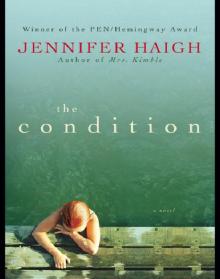 The Condition
The Condition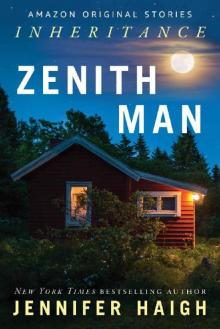 Zenith Man
Zenith Man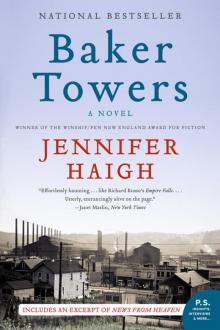 Baker Towers
Baker Towers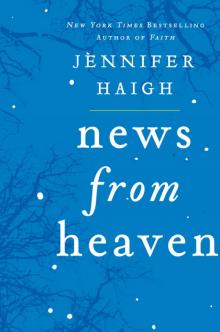 News From Heaven
News From Heaven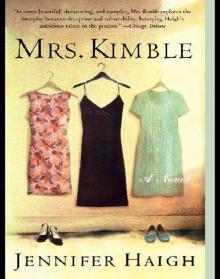 Mrs. Kimble
Mrs. Kimble